The climate for 'doing business' remains forbidding, taxtortion is still rife, corruption at state and district levels has increased, oil prices remain extortive with high taxation, and the continued red tape has kept the enterprise system as stifled as before, points out Debashis Basu.

Exactly 30 years ago, writing in this space, I argued there were two companies in Reliance Industries.
One set up manufacturing plants and sold products while the other was focused on raising capital and managing it well through its treasury.
They were in a symbiotic relationship.
Similarly, there are two Narendra Modis: One administers the country from a vastly expanded prime minister's office while the other is on a perpetual political campaign to win votes by maintaining a larger-than-life image in numerous ways.
For 10 years this strategy worked well.
Modi the politician won most of the elections using a recipe of Hindutva, nationalism, and welfarism, supported by well-oiled party machinery.
On the other hand, under Prime Minister Modi, interest rates were moderate, the fiscal deficit was within control, indirect taxes and levies were raised sharply, and higher revenues were deployed to roll out massive infrastructure projects.
The stock markets cheered and part of the urban elite were in raptures, buying into every idea and utterance of Mr Modi, no matter how many times he shifted the goalpost or replaced old slogans with new ones.
They were confident that he was on his way to a historic landslide in the general elections of 2024.
To the shock and surprise of most people, though, the election results proved that the last 10 years were an exception.
The norm of the previous 25 years -- coalition politics -- has reasserted itself.
Before the elections, politics didn't matter.
It was a given that Mr Modi's popularity ended any question about 'who would rule India'.
Now politics has entered the political economy again, as was the norm during Narasimha Rao's regime to later experiments with the Janata Dal, the Bharatiya Janata Party-led coalitions, to the two Congress-led ones right up to 2014.
Is coalition politics detrimental to the economy?
Can Mr Modi, allegedly an autocratic leader, run a coalition government?
There are strong arguments for and against both these questions.
We don't know the answer. What is more important is the answer that we know.
The electorate has sent a clear message that Hindutva, nationalism, and welfarism are not enough of a draw anymore.
The first two don't put food on their plate.
The third delivers a bare minimum.
But which voter, exposed to an aspirational lifestyle streaming from Instagram, Facebook, and entertainment serials is interested in the bare minimum?
It now appears that an embarrassing torrent of memes, catchphrases, alliterative coinages, clever abbreviations, schemes, yojanas and slogans such as Achhe Din, Amrit Kaal, and Viksit Bharat, all had a 'sell-by' date.
People are not buying them anymore. Yeh Dil Maange More.
The farmers want higher prices for their produce, the youth want employment, mothers desire education for their children, and wage-earners expect higher wages.
Can any political formation deliver these?
When Mr Modi became prime minister in 2014, he made many promises.
One of them was that farmers would get more than half the cost of production as profit.
In 2016, he announced something even more lucrative: Farmers' income would double in six years.
Not only did these prove to be empty promises but in a bizarre move to reform agriculture, he tried to railroad three farm Bills through Parliament in a high-handed manner.
The farmers went on the warpath and the government responded in an even more autocratic manner, digging up roads, placing spikes, and putting up barricades.
Inflation in health care and education, which impacts every citizen, is in double digits while the official inflation rate is ridiculously under 5 per cent.
Rural wages are stagnant, which means they are sharply lower in inflation-adjusted terms.
The upper middle class didn't know the real story because the mainstream media was persuaded not to report from the ground.
Through fallacious logic, a K-shaped recovery was dismissed as a better alternative than everyone getting poorer.
Now, the elites are suddenly worried about what else the unwashed masses would do if they remain unhappy with 5 kg of ration per month.
The only answer is a fundamental transformation, not more welfarism and certainly not slogans and memes.
One part of the transformation is empowering the private sector, which alone can establish a long-term sustainable cycle of job creation.
It may sound exaggerated but I think it is Mr Modi who should worship the job-creating business, rather than the other way around.
Ten years ago when Mr Modi came to power, the hope was that he would end crony capitalism and rampant corruption, which flourished under the Congress-led coalition government; and it would be replaced by a rule-based regime, which would cut taxes and the red tape, and encourage entrepreneurship.
Instead, the climate for 'doing business' remains forbidding, taxtortion is still rife, corruption at state and district levels has increased, oil prices remain extortive with high taxation, and the continued red tape has kept the enterprise system as stifled as before.
There has been little progress on 100 smart cities, while the existing ones are bursting at their seams, further sapping the productivity of the people and businesses.
All these indicators got worse under the BJP despite an absolute majority backed by supportive Constitutional institutions and media.
Does anyone expect these markers to improve now under a climate of more politics and less economy?
Or will we just muddle along as we have done in the past?
Debashis Basu is editor of moneylife.in and a trustee of the Moneylife Foundation.
Feature Presentation: Aslam Hunani/Rediff.com


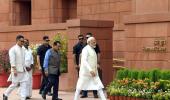


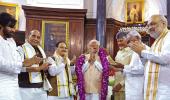



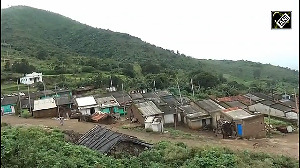
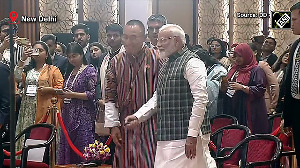
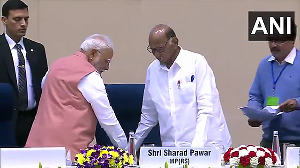
 © 2025
© 2025